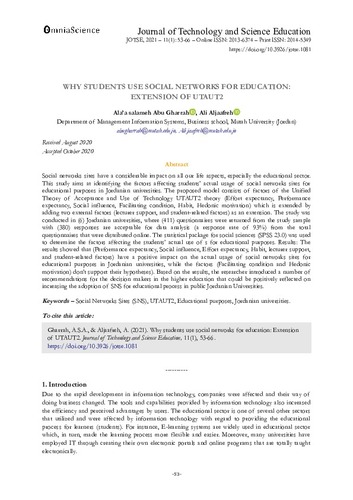Mostra el registre d'ítem simple
Why students use social networks for education: extension of UTAUT2
| dc.contributor.author | Gharrah, Ala’a Salameh Abu |
| dc.contributor.author | Aljaafreh, Ali |
| dc.coverage.spatial | east=35.8927338171771; north=32.07212626512928; name=Al Dia', Amman, Jordània |
| dc.date.accessioned | 2021-05-13T12:04:02Z |
| dc.date.available | 2021-05-13T12:04:02Z |
| dc.date.issued | 2021-04 |
| dc.identifier.citation | Gharrah, A.S.A.; Aljaafreh, A. Why students use social networks for education: extension of UTAUT2. "JOTSE: Journal of Technology and Science Education", Abril 2021, vol. 11, núm. 1, p. 53-66. |
| dc.identifier.issn | 2013-6374 |
| dc.identifier.uri | http://hdl.handle.net/2117/345556 |
| dc.description.abstract | Social networks sites have a considerable impact on all our life aspects, especially the educational sector. This study aims at identifying the factors affecting students’ actual usage of social networks sites for educational purposes in Jordanian universities. The proposed model consists of factors of the Unified Theory of Acceptance and Use of Technology UTAUT2 theory (Effort expectancy, Performance expectancy, Social influence, Facilitating condition, Habit, Hedonic motivation) which is extended by adding two external factors (lecturer support, and student-related factors) as an extension. The study was conducted in (6) Jordanian universities, where (411) questionnaires were returned from the study sample with (380) responses are acceptable for data analysis (a response rate of 93%) from the total questionnaires that were distributed online. The statistical package for social sciences (SPSS 23.0) was used to determine the factors affecting the students’ actual use of s for educational purposes. Results: The results showed that (Performance expectancy, Social influence, Effort expectancy, Habit, lecturer support, and student-related factors) have a positive impact on the actual usage of social networks sites for educational purposes in Jordanian universities, while the factors (Facilitating condition and Hedonic motivation) don’t support their hypotheses). Based on the results, the researcher introduced a number of recommendations for the decision makers in the higher education that could be positively reflected on increasing the adoption of SNS for educational process in public Jordanian Universities |
| dc.format.extent | 14 p. |
| dc.language.iso | eng |
| dc.publisher | OmniaScience |
| dc.rights | Attribution-NonCommercial 4.0 International |
| dc.rights.uri | https://creativecommons.org/licenses/by-nc/4.0/ |
| dc.subject | Àrees temàtiques de la UPC::Ensenyament i aprenentatge::TIC's aplicades a l'educació |
| dc.subject.lcsh | Motivation in education |
| dc.subject.lcsh | Online social networks--Research |
| dc.subject.lcsh | Education, Higher |
| dc.subject.lcsh | Universities and colleges--Jordan |
| dc.subject.other | Social Networks Sites (SNS) |
| dc.subject.other | UTAUT2 |
| dc.subject.other | Educational purposes |
| dc.subject.other | Jordanian universities |
| dc.title | Why students use social networks for education: extension of UTAUT2 |
| dc.type | Article |
| dc.subject.lemac | Xarxes socials en línia -- Ensenyament |
| dc.subject.lemac | Motivació en l'educació |
| dc.subject.lemac | Ensenyament universitari |
| dc.subject.lemac | Universitats -- Jordània |
| dc.identifier.doi | 10.3926/jotse.1081 |
| dc.identifier.dl | B-2000-2012 |
| dc.description.peerreviewed | Peer Reviewed |
| dc.rights.access | Open Access |
| local.citation.publicationName | JOTSE: Journal of Technology and Science Education |
| local.citation.volume | 11 |
| local.citation.number | 1 |
| local.citation.startingPage | 53 |
| local.citation.endingPage | 66 |


